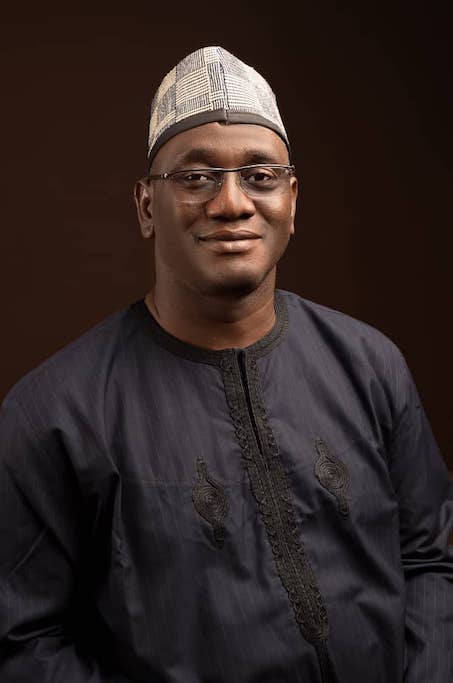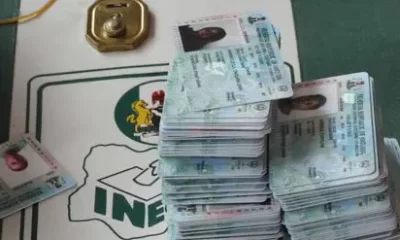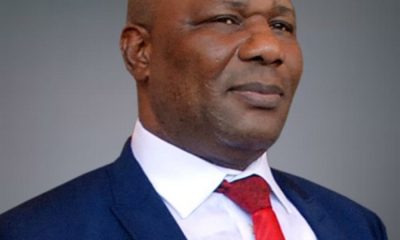COVER
Our Mission is to Make Benue People Feel The Positive Impact of Taxation-Ayabam

Mr. Andrew Ayabam is the current Chairman of the Benue State Internal Revenue Service Board(BIRS). He served first as chairman of the board between 2010 to July 2012 in the administration of the former governor, Gabriel Suswam. His two years of service at the board earned him much accolades because of his unequaled performance in revenue collection and administration.
Excerpt.
You are returning to this office for the second time after you left a couple of years ago can you tell us what the motivation is for the second coming?
The motivation has been always to excel, regardless of the circumstances. So that keeps me wanting to move on. For me it is also, a personal challenge to always put myself on sound footing and to be sure of what I am doing. So it is like a self challenge as well.
So if you are challenged by the inner passion to excel, what constitutes your vision going forward, the targets that are set before you on this assignment?
My targets are clear and they are also partly included in my contract or terms of engagement. That I should reorganize BIRS, bring it out from the woods and ensure that BIRS performs its role providing the much needed revenue for His Excellency Governor Samuel Ortom to deliver on his campaign promises which is to provide infrastructure and key social services needed by the Benue people for which they elected him into office.
Between the time you left and now, has there being anything fundamentally different in the operation of BIRS from the place you left about six or seven years ago?
Yes, significantly so. First let me reiterate this, staff or the people are the most important elements in any organization. I have met now on return, a very low staff morale and I met a situation where staff were not really exposed or trained on their jobs because of lack of experience to some of the issues in tax administration. Collection of revenue has not also performed as it should this time if that tempo we left behind was sustained. I also acknowledge that some staff, the good hands may have retired and left the system but am worried that not much was impacted on the upcoming or those who took over from them. This is not to say that there are no good hands within the service, but there is a lot that needs to be done to step up their morale and encourage them to delivery at the pace that we expect them to deliver now.
Flowing from that, one of the things that earned you more accolade from Benue people was the employment you offered graduates, the young people, you gave them employment opportunity. Given the present situation you have found on ground, do you have plans to still engage fresh hands, am sure some young graduate are looking forward to your second coming to get a job?.
We have been overwhelmed by this expectation that jobs will be available on my return. Without prompting, a whole lot of Benue youths have been coming forward to drop their CVs, so we are forced to create an opportunity for them to submit their applications to send in their CVs online, so we are able to manage the crowd that troop into BIRS daily. Certainly we will have to engage new and experienced hands. So we are adopting a two pronge approach to those issues. One, to get some of our experienced staff who were engaged by the State Government and posted to other agencies, we want to bring them back on at least an ad-hoc basis because of the type of training they enjoyed and experience they had that time. We want them to bring that to bear on the challenges we are having now. So will be using some of those and also, we will be enjoying new hands to add energy and vigour in the entire process of revenue collection. Staff engagement also serves as an added advantage, that of dissemination of needed information to the people. Because they are among the people, they are in a better position to preach taxation to the people and the people would learn better and faster from those kinds of engagement with our youth. We hope that we will build a sustainable BIRS with the young people because they lead their tomorrow right from today.
Talking about employing more hands, how many young graduates are we looking at?
That is not fixed. When the need arises we will increase. We are going to be doing it in phases because we are depending on our cost of collections to fund and sustain that activity. It is a contract employment. So if the revenue improves, the cost of our collection improves, we will continue to engage base on the needs and of course as we are able to sustain. If His Excellency who is people oriented thinks that we should have a fixed amount to fund that kind of activity we will be glad and we are hoping that he would also come up with such idea so that many more Benue youths are taken off the streets.
Benue people like most Nigerians are not enthusiastic about payment of taxes, how are you able to build that interest, or how are you going to encourage people to pay tax?
There are two things here, first, the people that were engaged live amongst our people so they are able to sell that message better. And it is in doing the job that their salaries are being paid. So there is a benefit derived directly from the process of recruitment, so people take that as an impact of taxation itself, so they are encouraged to pay, and because they have relatives or friends that work there, they are encouraged to pay tax. They are more or likely to buy into this message and deliver on that expectation. Secondly, we massively at that time and of course what we are going to revisit again, we went out to publicize government projects funded with tax money. When people see what government is doing with their money, they are more or likely to voluntarily pay their taxes. So His Excellency has taken over that challenge and he made quite a number of pronouncement since we assumed office, and deliberately telling the people where the money is going and we are going to be announcing these projects with the governor and the team when these projects are been executed so that through that way people are better encouraged to pay their taxes and do what they have to do to make the government to work.
Can you tell us how many people pay tax in Benue?
Well, that’s another challenge that we are having to rebuild. We hardly have had any active or realistic database to do that. Part of my new assignment and responsibility is to ensure that we build a robust data base so that government knows exactly what it is doing. We are going to be working with a couple of agencies to ensure that this happens. The most realistic will be to use the voter register because the general principle of eligibility lies or apply for voting as well. So we are going to be using that for the first time ever. From there we will now get a more realistic population or eligible data and from there also would now be able to tell how many of those eligible to pay tax are actually paying taxes and then we will give you precisely how many we are chasing into the tax net, but using the country’s average, if that applies here then about 13% of the state population which is about 5 million.
Now the taxable items, your tax sources or tax heads, do you have plans to expand avenues for taxation as part of the strategy to meet your set target?
The essence as such is not to further over burden the tax paying or compliant population. Our strategy and emphasis will be on ensuring that those who are not paying, comply with what is provided by law. We are trying to get more people to pay. We are hopeful that we will put some incentives through that will encourage even discount or reductions, rebate in some areas. Like land use charge or land charges generally, so that people are also better encouraged. So we will rather look at a reduction in rates than consider increasing the number of taxable heads or items.
Do you have plans to increase the number of agents based on present criteria?
No, the total number of revenue agents is about 22. Increasing the number is not necessary because in my first tenure we had about 7 agents. Now their responsibilities will be that it is BIRs staff meeting hat will be collecting money and managing the POS. We are using the POS now, that is electronic means of collection. In that way we are seeing real time online what is happening in the field. The agents will help to monitor, more or less be like a check to the activities so that there is some level of control. We hope that with some experience that they have in the field we can depend on this. We also have to work on the rates. I met on ground arbitrary rates being “gifted”,(permit me to use the word) to revenue agents. The revenue board is entitled to 10% as cost of collection, but we see as high as 50% to agents, in some cases I have seen some that is even 70% to the agents. So why do you pay higher than what you are entitled to? So we would address that. No agent will get even 7% of their collection having adopted an electronic means of collection so that will not happen. We will also encourage members of the public to report to us any infraction or any activities that they do not consider professional. Our hotlines are going to be published so you can reach either myself or our team so members of the public may reach us when the need arises.
This is a controversy one, how much comes to Benue State from IGR. It is a polemical issue in most of the states. People allege that what is collected is not declared or what is declared does not reflect the actual, what is the situation with BIRS?
There are standards of measuring collection. The global best practice is consolidated revenue collection. The law setting up agencies here in Benue and generally in Nigeria permit that we either spend a percentage or the entire revenue collections made by these agencies. So in reporting this you always have to take into consideration the total revenues collected regardless of whether or not this is spent by these agencies. BIRs as a revenue agency also have some revenue heads. I am barely a month now and I can only speak for my figures and that will be ready when the state reconciliatory committee meets and ratifies what ever figures we have made, but I can say my figures will certainly be higher than the previous months.
Now looking at the law, the enabling edicts, that empowers BIRS to carry out its activities, I know you got an amendment during your first tenure, many years down the line does that law still give you the legal strength to carry out your operations? Or are there certain areas you feel deserve to be amended?
Well, the law was amended after I left office the first time, maybe it was based on the needs of the time. Laws are not static, they are not stagnant and they are based on human activity which evolves over time, so laws also have to be amended from time to time due to circumstance and the needs of the time. So we will work towards the amendment which is just for the normal because circumstances change over time what we have on ground now is different from what existed may be few months ago, so we will continue to work on the amendment to make sure that Benue gets the best laws especially in our time. Our laws also indicate the rates to be charged and I mentioned earlier that I would rather go for rates reduction in some areas than increasing the revenue heads. Certain circumstance may also encourage different revenue heads or different presentation of the laws for better understanding by the paying publics. So when the need arises, we will approach the State Assembly for such amendment.
Recently the Chairman of the FIRS in response to a query issued him on the performance of the nation’s revenue attributed the low figure of revenue to the state of Nigeria economy, at the micro level of BIRS, to what extent has the overall national economy or in this case the state economy affected the collection efforts. What impact does it have on the operations of BIRS?
One, to the extent that the state depends more largely on federation account, FIRS is major contributor to that national trust or fund from where the Benue and other States derive their funding largely from. To that extent, Benue is impacted. So if something happens to FIRS which is a major contributor to the federation account from where Benue takes, naturally it will affect us. When Benue derives that, pays for services, salaries and all of that from where the state also derives its major source of revenue, the local economy is affected because larger population of organized work population is government workforces so whatever affects that workforce affects the local economy, the purchasing power and all of that. I stumbled at the SMEDAN report which indicate that 275,000 jobs were lost in a space of about 2 years, that has significant effect on BIRS. The personal income tax, land use charge, business premises registration vehicle registrations and all of that, so all of these taxes will be affected when the capacity of the state to pay for goods and services is also affected. So, yes, FIRS situation has a large bearing effect on the state’s economy.
One of the headaches and I think it is not Benue State alone, most of the States have is revenue generation efforts at the local government level. There seems to be lack of accountability, lack of transparency and even lack of capacity. Is there any relationship between BIRs and local government areas in the state in terms of partnerships for revenue and even in terms of building capacity and what specific area or technical support can BIRs give the LGAs?
The Law provide for a joint revenue committee which should be chaired by the Chairman of BIRs. We also note with concern that the activities of revenue collection seem to be inconsistent and maybe a non- challant attitude towards it. There are no records kept and all of that. The interesting thing is that the state Assembly is responsible for laws including revenue laws of the local governments. So to that extent, the powers to regulate is still vested with BIRS, but how much power is exercised is what has left a lot to be desired. Over the years, I don’t think BIRS has really stepped up to take control of what or has being involved in what happens at the local government level. The laws also provide for certain items to be exclusively collected by the local government, but where the state is able to harmonize this for the good of the state and local government it will be better. I cite examples in Lagos, Kaduna and to some extent, Rivers, Delta. So some of this local Governments are considered to be in urban areas and so some of their activities fall within the purview of the state and their agencies. When that happens, you see stronger synergy that enhances revenue administration activities. We hope to achieve that and we have started holding the joint revenue committee meetings. We hope that we will meet them quarterly and over time we will look at how to strengthen the administration at the local government levels, enhance transparency in the process and make the local government and the state a better place for revenue administration generally.
One issue that tends to give BIRS a negative image is the activities of revenue check points, sometimes one is not sure whether these are staff or agents of BIRs or they are just taking laws into their hands, so what really is BIRS policy on this issue of blocking high ways and forcing people to stop for the purpose of collecting revenue?
Thank you for bringing this up. That has being my biggest challenge since assumption of office at least for this second time. All manner of touting and highpoint robbery goes on at the roads in Benue State. Benue has over the last few years earned a very bad name as being one of the bad places to do business, particularly businesses that involve the use of roads. Since assuming office, I have engaged relevant security agencies. The Governor is not happy about this and he has charged us to do all that we can to reduce this to the barest minimum. We have a situation where people just take laws into their hands, print all manner of receipts, largely illegal to extort money from unsuspecting members of the public on the roads employing all manner of crude tactics and means. For the records, Benue State has only 10 gazzetted inspection points largely for produce and Vertinary inspection. There are 10 points. But we met on ground a situation of about 200 inspection points to count, existing in the State. So I have worked out measures in clearing that. In the news recently about 12 people are in imprison already on account of operating illegal points. We have also mandated all our staff and agents to use only POS as a means of collection, we hope that when we do this, those who are engaged in these activities will not be patronized and would have to naturally leave our roads. That is combined with the Police and Military patrols that have been instituted. You find a situation where a truck of lets say 911, not a very big truck, it loaded with oranges from Ushongo Local Government, before they leave kadarko, they would have spent more than 200,000 on largely illegal fees and charges. So we leave the buyers with no option than to price down the produce from Benue farmers , so the farmers don’t get value for their products. So in the last two years plus, oranges were not sold for more than 500 naira a bag and in some places 300 naira. And that is very unfair to a large population as a result of those actions being perpetrated by just a few persons. In the Usongo axis we have been able to significantly clear that. Am happy to say that for the first time in three years oranges are being sold at more than 3000 naira and that is just because of this action that we have taken. So you see how some activities of just a few people impact negatively on a larger population of the state. With 3000 naira per bag, they are more able to meet their personal expenses, depend less on government activities which may not be enough to pay their bills. So we are hoping that we continue to do this and if sustained, Benue people will get more value for their products and hopefully someday, some processing facilities will come to Benue necessitating the supplies locally instead of selling raw materials outside the State.
I imagine that this action may have put you in a collision course with some of these people involved in these illegal activities, do you feel unsafe carrying out this assignment?
The threats are there. That is the reality of the times, but I think I have more overwhelming zeal to succeed, and I think the support and the good will overwhelms the threats at least in current times. Like I said these are activities carried out by few elements to the detriment of the larger society. So I believe the larger society agrees with me, BIRS and their prayer and goodwill is with us and am encouraged more by that. The threats will continue to hold the poor farmer to ransom, which a few others would want us to encourage.
How are you going to tackle the issue of multiple taxation to ensure that the people are not over burdened?
Well, through sensitization. We have continued to sensitize the people as to what to pay, where to pay and how to pay. When a tax payer is informed as to their responsibility and what to do, they know how to confront some of these challenges better. We also have the hotlines, we are also training our staff to also know what to do out there on the field to engage with tax payers.
So most importantly is the tax payer education, because tax payer is the target both for multiple taxes as well as the genuine and legitimate taxes. So they are the ones to face the approach and when they do not fall, the system stands stronger. So they need the information to be able to confront these challenges.
How much cooperation does BIRS enjoy from Federal Institutions or agencies and some of the institutions like Banks in the State? How is the compliance?
I think now it is enormous. With the introduction of the IPPIS, payments are deducted and made to the office of the Accountant General of the Federation. So that makes it largely seamless. We are hoping that as more agencies enroll on the IPPIS, the better for us. Recently some reconciliations were done and returns were made by the federal government it will be ongoing until we reach a near perfect destination. But as it stands, the cooperation is okay and is improving.
Yes, the compliance is significantly improving and is very near up to date.
COVER
Dangote Refinery Appoints David Bird New CEO

Dangote Group has named David Bird, former Chief Executive Officer (CEO) of Oman’s Duqm refinery, as the new chief executive of its petroleum and petrochemicals division in a bid to address operational challenges and drive its next growth phase.Bird officially assumed his role in July, taking charge of Dangote’s fuels and petrochemicals business, which launched the world’s largest single-train refinery last year.
Aliko Dangote, founder of the conglomerate, remains chairman of the refining arm and CEO of the overall group, which spans sectors including cement, fertilizer and sugar. Bird’s appointment is seen as a strategic move to leverage his experience at OQ8, where he oversaw the Duqm refinery’s expansion and crude diversification just before its 2023 test runs.In written comments to Platts, Bird stated his priority at Dangote would be advancing the group’s footprint beyond the Nigerian market and across the African continent.He also noted that his role involves ensuring maximum output and efficiency for the refinery while positioning the group as a global refining leader.The move came amid setbacks at the 650,000 barrels-per-day (b/d) Lagos refinery, which has faced multiple operational hiccups and “Design issues” that have hampered its ramp-up. The business has also cited an unfriendly regulatory environment as a barrier to operations.Since commissioning in January 2024, the refinery has made a significant impact on Nigeria’s energy market by slashing gasoline imports. However, Aliko Dangote has previously condemned “rent-seeking” trade practices and low-quality fuel imports for straining the plant’s progress.In an earlier interview, Bird promoted a strategy centered on trading performance, high plant utilization, and flexible feedstock options. His approach supports Dangote’s recent pivot to refining a broader mix of crude oils, as supplies of the Nigerian-grade crude initially intended for the plant have become limited.Despite its global ambitions, the refinery remains bound by a naira-based deal requiring it to supply a set volume of petroleum products to the domestic market via the Nigerian National Petroleum Company, which holds a 7.2% stake in the project.Looking ahead, Dangote Group is planning to expand the refinery’s capacity to 700,000 b/d, enhance port infrastructure, and develop overseas storage facilities in countries such as Namibia. In August, it is set to roll out its own distribution business with a fleet of 4,000 CNG-powered trucks.Executives have also confirmed plans to list the refining arm on both the London and Lagos stock exchanges.COVER
Nigeria, Benin Forge Unified Trade Path on New Framework

By David Torough, Abuja
In a decisive move to boost regional economic integration, Nigeria and the Republic of Benin have agreed on a comprehensive trade framework aimed at removing trade bottlenecks, strengthening bilateral ties and unlocking new economic opportunities.The agreement was reached during a high-level bilateral meeting held at the Ministry of Economy and Finance in Cotonou, Benin Republic.
The session brought together top government officials, customs authorities and trade policy experts from both countries to harmonise cross-border trade processes and develop a unified trade agenda. Nigeria’s Minister of Industry, Trade and Investment, Jumoke Oduwole, hailed the framework as a strategic advancement in West Africa’s drive for regional economic prosperity.“This agreement demonstrates the strong political will of both nations to foster inclusive and sustainable trade,” Oduwole stated, noting that it follows the Memorandum of Understanding signed by Presidents Bola Ahmed Tinubu and Patrice Talon at the recent West African Economic Summit.She said the agreement will be driven by four key thematic areas: trade facilitation, enforcement, data sharing, and infrastructure development.“Our shared goal is to dismantle trade barriers, enhance logistics, and leverage trade as a tool for job creation and inclusive growth,” she added. “Nigeria is also positioning itself to play a leading role in shaping equitable global trade systems.”The Comptroller-General of the Nigeria Customs Service (NCS), Adewale Adeniyi, reiterated the Service’s commitment to the agreement, highlighting the extensive technical engagements that led to the joint framework.“This outcome reflects over 48 hours of technical consultations between both customs administrations. It’s a blueprint aligned with the economic vision of both Presidents,” Adeniyi said.He disclosed that a formal Memorandum of Understanding, building on the framework, is scheduled for signing in the first quarter of 2026. He also outlined plans for corridor-based trade solutions, system connectivity, and enhanced facilitation measures targeted at small and medium-scale enterprises.“Our systems are now interconnected. We’re rolling out corridor-specific initiatives to simplify customs procedures, eliminate bureaucratic delays, and support local businesses,” he said.Adeniyi also commended his Beninese counterpart, Mrs. Adidjatou Hassan Zanouvi, for her collaborative efforts and Benin’s support for Nigeria’s leadership at the World Customs Organisation (WCO) Council meeting in Kinshasa, DRC.As part of the bilateral engagement, both delegations jointly toured the Port of Cotonou to evaluate operational procedures and identify opportunities for modernisation. They also visited the Seme-Krake Joint Border Post, reinforcing their commitment to integrated and secure border management.The newly established framework is expected to mark a turning point in Nigeria-Benin trade relations—one grounded in transparency, digital innovation, and shared economic growth.COVER
Again, Flood Submerges Farmlands, 18 Communities in Niger

By Dan Amasingha, Minna
Flood has again submerged several farmlands in some communities in Niger State.This followed an early morning rainfall yesterday which ripped through farmĺands in Kafin Koro, Paikoro local government areas of the state.The flood also affected 18 communities in Lapai Local Government Area of the state where some farmlands were also affected, and many others at risk of being swept away.
Some of the affected communities include Dere, Eshi, Apataku, Tsakanabi, Kuchi Kakanda, Arah, Achiba, Rebba, Ebwa, Pele, Edda, Rigido, Gbami, Yawa, Baka, and Muye. The state government on Sunday re-echoed its earlier warning to riverine communities in the state to immediately relocate to higher grounds, saying the rains have intensified across the state.The Special Adviser to the Governor on Communication, Media and Strategy, Jonathan Vatsa, in a statement, appealed to communities in the affected areas to immediately relocate to a safer place to avoid further disaster in the state.Vatsa said that though the government understood the people’s attachment to their ancestral homes, there is the need for them to adhere to the government warning and relocate pending when the rains woulď be over.“We as a government will continue to be proactive by appealing to the people, especially those in the flood-prone areas, to immediately move upland to avoid the experience of the Mokwa disaster.“The government is aware of their attachments to their ancestral homes and lands, but with the various flood alerts, and what we are already experiencing, there is an urgent need for them to heed to the government’s warning.“The Mokwa experience is still very much with us, and we cannot afford a repeat of such an experience.“That is why the government is urging the people to move to a higher ground,” Vatsa said.The special adviser disclosed that the Nigerian Meteorological Agency had previously identified 15 out of the 25 local government areas in the state as very vulnerable to flooding every rainy season.The Federal Government had instructed residents of four local government areas of the state to move to safer locations as heavy rainfall was expected to trigger flooding between July 31 and August 5, 2025.This latest directive by the Federal Government follows a flood alert issued by the National Flood Early Warning Centre under the Federal Ministry of Environment, which revealed that communities in Rijau, Sarkin Pawa, Suleja, and Mashegu are at high risk of flooding during the forecast period.The Federal Government’s warning was contained in a statement titled “Flood Prediction”, signed by the Director of Erosion, Flood, and Coastal Zone Management Department, Usman Bokani, where he urged relevant authorities to take proactive measures to mitigate any disaster.While disclosing that the state government would soon embark on an enlightenment campaign to all the flood-prone communities, Vatsa called on traditional rulers, community and religious leaders to join the government in sensitising the people.NUJ, SERAP Tackle Bago over Closure of Media HouseThe Nigeria Union of Journalists (NUJ), Niger State Council, has condemned the recent directive by Governor Mohammed Umaru Bago to shut down Badeggi FM 90.1, a privately owned radio station based in Minna. The union described the move as an abuse of executive power and a threat to democratic principles.In a statement signed by the council’s Secretary, Adamu Usman Chiji, the NUJ urged Governor Bago to withdraw the closure order and follow due process. The union emphasized that only the National Broadcasting Commission (NBC) has the legal authority to issue or revoke broadcast licenses.“The media plays a critical role in holding public officers accountable,” the statement read. “Any concerns about professional misconduct should be directed to the appropriate regulatory bodies, not met with unilateral shutdown orders.”The NUJ reminded the governor that engaging the media through constructive dialogue, rather than issuing threats, is more in line with democratic norms. It also noted that a revalidation committee led by senior journalist Pastor Dan Amasingha has been established to ensure adherence to journalism ethics in the state.Meanwhile, the Socio-Economic Rights and Accountability Project (SERAP) has added its voice, issuing a 48-hour ultimatum to Governor Bago to reverse the closure and reinstate the station’s broadcasting licence.In a letter dated August 2, 2025, and signed by Deputy Director Kolawole Oluwadare, SERAP described the governor’s actions—including the revocation of the station’s license and threats to demolish its premises as arbitrary, unlawful, and a violation of both Nigerian constitutional rights and international human rights obligations.“Vague and unsubstantiated accusations of incitement cannot justify silencing critical media voices,” SERAP warned. “This move undermines press freedom and has a chilling effect on other media organisations, particularly ahead of the 2027 elections.”The group stressed that freedom of expression and media independence are vital to democracy, and warned of legal action if the state fails to comply with its demands.As of the time of filing this report, the Niger State Government has not responded to the NUJ and SERAP statements.


























